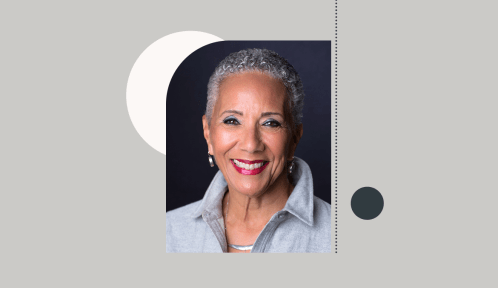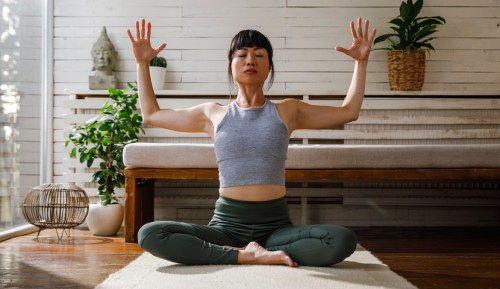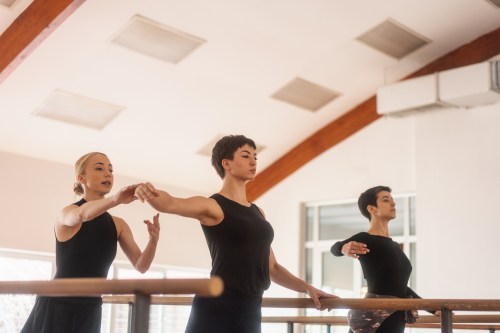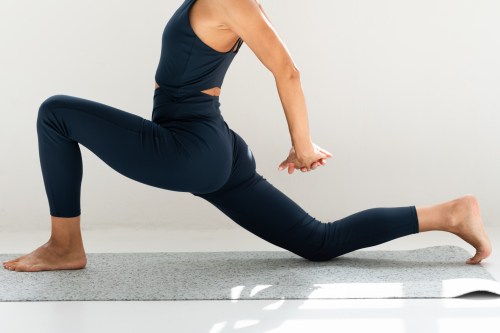Our editors independently select these products. Making a purchase through our links may earn Well+Good a commission
When I found yoga over 14 years ago, my practice quickly became a vehicle for personal transformation. It still grounds me while I navigate racism in the United States—because embodied white supremacy disconnects us from ourselves, and yoga is how I sustain self-connection.
However, at the center of my practice, there is a deep commitment to co-creating spaces for other Black people to grow through breath and movement. I believe that healing and inner change begin when we feel safe enough to process our experiences, reconnect with ourselves, and breathe. As a yoga teacher and studio co-owner, holding space for others is part of my transformation.
That said, I take lots of comfort in knowing I’m part of a tradition of Black and brown yoga teachers in the U.S. who’ve used their practice to help others reconnect to themselves. So when I was asked to interview psychologist, yoga therapist, educator, author, and elder Gail Parker, PhD, I knew she’d have deep wisdom to share.
When Dr. Parker began practicing yoga at 22, she discovered that it was a way to heal and process the impact of racism she was experiencing. It was 1968, shortly after the Detroit riots and Martin Luther King Jr.’s assassination. From her very first class, she was hooked. “I was tapping into that deeper level of being and freedom that exists within,” Dr. Parker says. “And I can’t explain it better than that.”
Since then, Dr. Parker has used yoga to inform her work as a therapist. Her first book, Transforming Ethnic and Race-Based Traumatic Stress with Yoga, focuses on the theoretical impact of racism, but her newest, Restorative Yoga for Ethnic and Race-Based Stress and Trauma, provides readers with practical steps to relieve race-based traumatic stress in the body. Through her work, Dr. Parker shows us how to create space for discomfort because witnessing all of our emotions is a huge part of the healing process.
In the following interview, I had the honor of speaking with Dr. Parker about her 40-year yoga practice, how we heal through stillness, and the importance of both personal transformation and community care.
Paris Alexandra: Dr. Gail, your work focuses on using yoga to alleviate trauma. Where does trauma live in the body?
Dr. Gail Parker:There are many different places that trauma lands in the body, and it’s different for every individual. For some, it feels like a knotted stomach or a gut punch. Others may feel a racing heart, a tight jaw, a blinding headache, a debilitating backache, or tenseness in various body parts.
The idea is to feel whatever you are experiencing in your body and not deny or avoid the discomfort by self-medicating. Awareness is our best tool for dealing with a traumatic injury because awareness is our guide to wise and effective action.
Self-care is not selfish. Self-care is being self-aware. -Gail Parker, PhD
How does stillness play a role in our healing journey?
For Black people, in particular, you’re on high alert most of the time because of the nature of the cultures we live in. We don’t even know it, and we don’t even realize that we’re under stress because we’ve adapted to it. You need a place to rest, relax, and let go. We are training the nervous system to be safe in stillness.
Yoga is practiced in stillness. It’s practiced in low light so that you’re not overly stimulated. For restorative yoga, pillows, blankets, and bolsters support the body in maintaining yoga postures for extended periods. Focusing on the breath in stillness stimulates the parasympathetic nervous system, which is the part of us that slows us down and brings us into rest and comfort.
Throughout your book, readers are given tools such as journaling prompts, meditations, and affirmations. What role do affirmations play in supporting your healing practice?
I know the power of an affirmation. You don’t have to believe it. You don’t have to mean it. Just keep saying it, just keep saying it. The language we speak to ourselves is powerful. And eventually, there’s an energetic internal resonance that lifts you up.
My experience of resonance is there’s something internal that lifts me up, gets my bodily experience of it, and has my full attention. It’s not a thought process, it is a felt experience of upliftment. My husband says affirmations, “clear away the fog so that my soul can shine.” That’s what we want—for our souls to shine.
Specifically for Black women, why is self-care important?
We tend to prioritize everyone else. We take care of everyone and everything else and neglect to take care of ourselves because we don’t have time. We feel like it’s selfish, and we have all of these reasons we can’t get around to taking care of ourselves. But this is what I say: Self-care is not selfish. Self-care is being self-aware. If I’m taking care of me and you’re taking care of you, we are members of the community.
Rumi says, “never give from the depth of your will, give from your overflow.” Fill yourself up to overflowing, and you give from that place of energy where, you know, when I have more than enough to share, then I will share it.
What wisdom would your 40 year-old-self tell an even younger version of yourself?
You already are, who you’re trying to become. Yep.
This interview has been edited and condensed for clarity.
Oh hi! You look like someone who loves free workouts, discounts for cutting-edge wellness brands, and exclusive Well+Good content. Sign up for Well+, our online community of wellness insiders, and unlock your rewards instantly.
Sign Up for Our Daily Newsletter
Get all the latest in wellness, trends, food, fitness, beauty, and more delivered right to your inbox.
Got it, you've been added to our email list.











